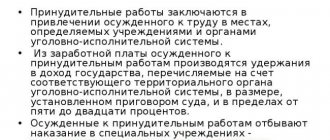Criminal Code of the Russian Federation in the latest edition:
Article 84 of the Criminal Code of the Russian Federation. Amnesty
1. An amnesty is declared by the State Duma of the Federal Assembly of the Russian Federation in relation to an individually unspecified circle of persons.
2. By the amnesty act, persons who have committed crimes can be released from criminal liability. Persons convicted of committing crimes may be released from punishment, or the punishment assigned to them may be reduced or replaced with a more lenient punishment, or such persons may be released from an additional type of punishment. Persons who have served their sentence may have their criminal record expunged by an amnesty act.
Return to the table of contents of the document: Criminal Code of the Russian Federation in the latest edition
Comments on Article 84 of the Criminal Code of the Russian Federation
Amnesty (amnestia) - translated from Greek means oblivion, forgiveness and is a legal form of state forgiveness of persons who have committed crimes.
The act of amnesty is the basis for terminating criminal prosecution.
“In its political and legal meaning, amnesty is an act of mercy, a manifestation of humanism, the generosity of the state towards citizens who have violated the criminal law, and implies the full or partial release of certain categories of persons from criminal liability and from punishment” (Determination of the Constitutional Court of the Russian Federation dated 18.09. 2014 N 1828-O).
The amnesty provides for several types of mitigation of the situation of convicted persons:
- exemption from the main punishment;
- reduction of the term (size) of the imposed sentence, including reduction of the unserved part of the sentence;
- replacing the imposed punishment with a more lenient punishment;
- exemption from additional punishment.
Persons who have served their sentence may have their criminal record expunged by an amnesty act. For example, clause 12 of the Resolution of the State Duma of the Federal Assembly of the Russian Federation dated April 24, 2015 N 6576-6 State Duma “On declaring an amnesty in connection with the 70th anniversary of the Victory in the Great Patriotic War of 1941-1945,” the criminal record was expunged from persons exempted from punishment on the basis of clause. paragraphs 1 - 4 and 7 - 9 of this Resolution.
An amnesty is declared in relation to an individually indefinite number of persons ; the act of amnesty is designed for repeated use. The decision to apply an amnesty is made by the relevant authority in relation to each person individually. These law enforcement acts (decrees, rulings), in addition to court decisions, are approved by the prosecutor. The resolution declaring an amnesty does not abolish or change the norms of criminal law, does not eliminate crime and the punishability of the act. Also, the amnesty act does not question the legality, validity and fairness of the court verdict.
Amnesty is an unconditional type of exemption from criminal liability and from punishment: the decision to apply an amnesty cannot be canceled regardless of the further behavior of the amnestied person.
Amnesty acts usually apply to criminal acts committed before its adoption or entry into force.
Exemption from criminal liability on the basis of an amnesty act in accordance with clause 3, part 1, art. 27 of the Code of Criminal Procedure of the Russian Federation is drawn up:
- at the stage of initiating a criminal case - by a decision to refuse to initiate it;
- at the stage of investigation or in relation to cases in which the investigation has been completed, but they have not been sent to court - by a decision to terminate the criminal case;
- in cases brought to court, if the act of amnesty came into force before the start of the trial, by a judge’s decision to terminate the criminal case (Article 239 of the Code of Criminal Procedure of the Russian Federation).
A person released from punishment as a result of an amnesty is considered to have no criminal record (Part 2 of Article 86 of the Criminal Code of the Russian Federation).
Amnesty does not mean the rehabilitation of a person and is only forgiveness for committing a crime. Therefore, release from criminal liability in connection with the amnesty act is possible only if there are no objections to this on the part of the accused. If there are such objections, the proceedings in the case continue in the usual manner and are brought to trial, in which the court decides either an acquittal or a conviction, but with release from punishment under the amnesty act.
In law
To ask for a mitigation of punishment or to apply for a pardon, according to the Constitution of the Russian Federation, Art. 50, every person has the right.
According to Article 50 of the Constitution of the Russian Federation, every person who has been convicted has the right to apply for a pardon or ask for a change in punishment to a more lenient one. This norm confirms that the rights and freedoms of citizens in a rule-of-law state are the highest value. But not every prisoner can count on this if he does not meet the necessary criteria.
What or who grants pardon?
All actions take place on the basis of Article 89 of the Constitution of the Russian Federation and the provisions of the Criminal Code. An act of mercy on the part of the state can change the situation of a convicted person for the better: mitigate the punishment, reduce his term or remove his criminal record. Therefore, the prescribed norms determine according to what criteria and to what person such an action can be applied.
As mentioned earlier, issuing pardons falls within the powers of the President. According to the Constitution of the Russian Federation, he does not have the right to delegate these powers to other officials. However, this does not exclude the participation of other government bodies in the process.
Contents of the resolution declaring an amnesty
The resolution declaring an amnesty shall indicate the persons to whom the act of amnesty applies, the conditions for its application, as well as persons to whom the amnesty does not apply. In the preamble of the resolution declaring an amnesty, as a rule, the principle of humanism is indicated as a justification for its announcement.
The circle of persons who are subject to a specific amnesty is determined in the amnesty act itself by listing them in as much detail as possible (for example, minors; women who have committed a crime for the first time; military veterans; disabled people; persons convicted of crimes of a certain category or who have been assigned a certain type of and the amount of punishment, etc.). Typically, several such criteria are specified.
In the second part of the resolution on declaring an amnesty, by establishing certain restrictions, categories of persons who are not covered by the amnesty are determined. These restrictions are associated with the characteristics of the individual (malicious violators of the established procedure for serving a sentence) or with the nature of the crime committed (the so-called article-by-article restrictions).
For convicts in respect of whom, along with punishment, compulsory medical measures were imposed and subject to release from punishment, the amnesty act is usually applied after completing an intensive course of treatment.
In addition to the amnesty act itself, the State Duma usually adopts an additional resolution on the procedure for applying this act, which clarifies issues related to its application (the bodies entrusted with the implementation of the amnesty are determined, the content of the terms used in the amnesty act is revealed, etc. .).
Amnesty is an imperative (mandatory) type of exemption from criminal liability and punishment, since it does not depend on the discretion of the executing body and the will of the amnestied person.
Pardon
A pardon is a decision by the supreme authority (head of state) to fully or partially release a convicted person from an assigned or, possibly, subsequently imposed punishment, and to replace the court decision with a more lenient sentence. The pardon process is always individual. This means that the decision is made in relation to a specific person or several specific individuals.
The basic law of the state states that every convicted person has the right to ask for a pardon or commutation of punishment. To do this, it is necessary to apply to the head of state through the administration of the correctional institution or through the bodies of the executive system.
As mentioned earlier in the context of the concept of granting pardon, it is within the competence of the head of state to carry it out (in other words, to spare a person who has been convicted of a crime), as written in the Criminal Code and the Constitution. Approval from the state can significantly improve a citizen’s situation by mitigating the imposed punishment. To do this, either the convicted person himself, or his defense lawyer, relatives, the administration of the institution where the person is serving his sentence, or the executive inspectorate submits a petition, provided that the convicted person has been released but has an unexpunged criminal record.
At what stages of criminal proceedings can amnesty be applied?
The amnesty is under the exclusive jurisdiction of the Russian Federation (clause “o” of Article 71 of the Constitution) and is declared by the State Duma of the Federal Assembly of the Russian Federation (clause “g” of Part 1 of Article 103 of the Constitution) by adopting a resolution declaring an amnesty and a resolution on the procedure for applying the resolution about declaring an amnesty.
Amnesty is applied at different stages of criminal proceedings and, as mentioned above, provides for various types of mitigation of the situation of persons who have committed crimes: exemption from criminal liability, exemption from punishment, reduction of the unserved part of the sentence, expungement of a criminal record, etc.
In practice, there are cases where the act of amnesty itself provided for the possibility of terminating criminal cases in which the person who committed the crime is not known to law enforcement agencies. In such cases, clause 3, part 1, art. 27 Code of Criminal Procedure of the Russian Federation.
1) The amnesty act comes into force before the start of the trial
If the act of amnesty comes into force before the start of the trial on the merits, then the release of suspects (accused) from criminal liability is carried out by terminating the criminal case being processed by the inquiry body, the preliminary investigation body or the court, or by terminating the criminal prosecution. If the suspect (accused) objects to the termination of the criminal prosecution, the criminal proceedings continue in the usual manner (Part 2 of Article 27 of the Code of Criminal Procedure of the Russian Federation). As the Constitutional Court of the Russian Federation emphasized in its Resolution No. 18-P of October 28, 1996, the decision to terminate a criminal case does not replace a court verdict and, therefore, is not an act that establishes a person’s guilt. Therefore, a criminal case cannot be terminated if the accused objects to this and petitions to continue the proceedings.
2) The amnesty act comes into force during the trial
If the amnesty act comes into force during the trial, then the court, in accordance with paragraph 1 of Art. 254 of the Code of Criminal Procedure of the Russian Federation terminates the criminal case at a court hearing or, if the defendant objects to the termination of the criminal prosecution, continues the consideration of the criminal case in the usual manner until it is resolved on the merits. In the event of a guilty verdict and if there are grounds for applying an amnesty, the court releases the convicted person from punishment (Part 8 of Article 302 of the Code of Criminal Procedure of the Russian Federation). If there is a guilty verdict, we can only talk about release from punishment, and not about release from criminal liability.
3) The amnesty act was issued after the verdict was announced
If an amnesty act is issued after the verdict is announced, but before it enters into legal force, the court of second instance leaves the conviction unchanged and releases the convicted person from serving the sentence (Clause 1, Part 6, Article 302 of the Code of Criminal Procedure of the Russian Federation), if the verdict is not subject to cancellation or change for other reasons.
Application process
To grant a pardon, it is necessary to send a petition to the president of the country. To do this, the perpetrator himself submits a petition. This can be done by his lawyer either through the administration of the colony or through the executive inspection. Upon receipt of this application, the authorities send it to the Ministry of Justice (no later than twenty days after receipt). Over the next seven days, the petition and other necessary documents that establish the identity of the convicted person are transferred to the commission, which deals with issues of pardon. After this, all documents on the perpetrator with the conclusion issued are sent to the governor of the subject (period - no more than thirty days). The last stage is the transfer of all documents to the head of state with the presentation of the possibility of pardoning the guilty person within a period of no more than fifteen days. This is exactly what the process of filing a petition looks like in the Russian Federation.
Amnesty deadline
The resolution declaring an amnesty specifies the period for the implementation of the amnesty (usually six months). However, this does not mean that after the expiration of the specified period, the amnesty act ends, since the amnesty is an indefinite act and all persons to whom it applies who committed crimes before the amnesty act came into force, regardless of the time the person was brought into criminal proceedings, are subject to its actions. responsibility.
the statute of limitations expires during the execution of the amnesty , not the provisions of the amnesty act, but the provisions of Art. 78 or Art. 83 of the Criminal Code of the Russian Federation as more preferential.
In judicial practice, there are situations when the actions of the perpetrator are subject to several acts of amnesty . If there are competing provisions, the provisions of the amnesty act shall be applied, the moment of entry into force of which is closest to the time of the commission of the crime, and the provisions of which are most favorable to the convicted person or other person to whom the amnesty act applies. In such cases, one should be guided by the criminal law principle of justice, and not by the provisions of Art. 10 of the Criminal Code of the Russian Federation.
What should you keep in mind when filing your application?
During the process, it is important to consider the following criteria:
- the degree of the crime, its severity and nature;
- the behavior of the convicted person while serving his sentence, namely: whether he worked well, whether he participated in the creative activities of the correctional institution, or whether he committed any illegal actions;
- the time the prisoner spent in a correctional colony (this is important, since the pardon process does not apply to people who have not served half of their sentence);
- whether any atrocities were committed while serving the sentence (applies only to a suspended sentence);
- whether there was an early release, whether an act of amnesty or pardon was previously applied to this convict;
- compensation for damage caused by crime;
- all personal data of the convicted person are taken into account, such as age, number of convictions, presence of a family, children, and so on.
All of this information is collected so that the president can make a correct, informed decision regarding the person who is petitioning. Consideration of such issues is subject only to the head of state.
In case of refusal
The powers of the head of state include not only approving pardons in the Russian Federation, but also refusing them. Who notifies the culprit that his application has been denied? If the petition is rejected by the president of the country, the governor sends a written response to the convicted person. After receiving a response, there is a moratorium on filing another petition. The moratorium period is one year. After this period has expired, the prisoner has the right to try again and reapply.
As for prisoners serving a life sentence, the same application procedure is followed. Only the head of state can make a decision. However, there is some difference. In case of a life sentence, a petition can be submitted only after serving 25 years in prison.









